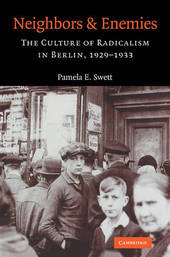
|
Neighbors and Enemies: The Culture of Radicalism in Berlin, 1929-1933
Paperback / softback
Main Details
| Title |
Neighbors and Enemies: The Culture of Radicalism in Berlin, 1929-1933
|
| Authors and Contributors |
By (author) Pamela E. Swett
|
| Physical Properties |
| Format:Paperback / softback | | Pages:360 | | Dimensions(mm): Height 234,Width 155 |
|
| Category/Genre | World history - from c 1900 to now |
|---|
| ISBN/Barcode |
9780521039970
|
| Classifications | Dewey:943.155085 |
|---|
| Audience | | Professional & Vocational | |
|---|
| Illustrations |
1 Tables, unspecified; 9 Halftones, unspecified; 10 Line drawings, unspecified
|
|
Publishing Details |
| Publisher |
Cambridge University Press
|
| Imprint |
Cambridge University Press
|
| Publication Date |
20 July 2007 |
| Publication Country |
United Kingdom
|
Description
Neighbors and Enemies provides an interpretation of the collapse of Germany's first democracy, the Weimar Republic, which ended with the naming of Adolf Hitler as chancellor in January 1933. This study focuses on individual workers in Berlin and their strategies to confront the crises in their daily lives introduced by the transformation of society after 1918 and intensified during the Depression. Tensions between the sexes and generations, among neighbours, within families, and between citizens and their political parties led to the emergence of a radical - and at times violent - neighbourhood culture that signalled a loss of faith in political institutions. Swett offers an interpretation that marries a history of daily life in Depression-era Berlin with an analysis of the meanings of local politics in workers' communities, shifting our focus for understanding Weimar's collapse from the halls of governmental power to the streets of the urban core.
Reviews'Pamela Swett's fine new study of neighbourhood radicalism in late Weimar Berlin not only fleshes out our current knowledge but recasts it. Swett demonstrates how to write a history that fully incorporates gender and generation. ... the stories of neighbourhood battles and denunciations are riveting.' The German History Society
|